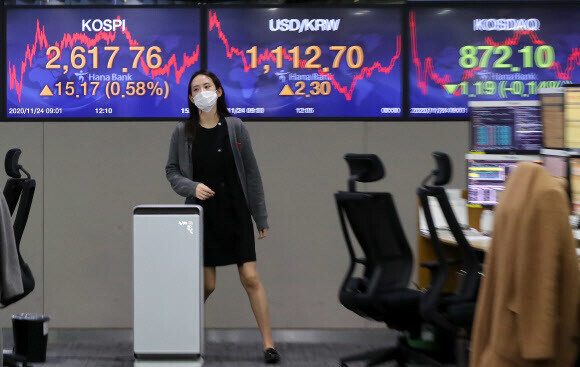hankyoreh
Links to other country sites 다른 나라 사이트 링크
KOSPI sets new record as purchases from foreign investors surge

The KOSPI index has set a new record as it passes the 2,600-point mark on an upward slope of purchases from foreign investors.
On Nov. 23, the KOSPI closed trading at 2,602.59 points, up by 49.09 (1.92%) from the day before.
Purchases from foreign investors propelled the index to its new all-time high. Foreign buyers made net purchases of 988.5 billion won (US$890.8 million) on the securities market. The trend has been one of net purchasing for 13 straight days since Nov. 5 (1.14 trillion won, or US$1.03 billion). Net sales of 873.8 billion won (US$787.37 million) and 59.4 billion won (US$53.52 million) were registered for individual and institutional investors, respectively.
Foreign investors did not appear deterred by the recent resurgence of South Korea’s COVID-19 cases, which has triggered fears of an economic slump. Amid a series of reports on vaccine development, the mood reflects anticipation that South Korea will benefit as an export-focused economy. The rise has been fed by a combination of perceptions that South Korean stock prices are relatively inexpensive, the strong third quarter performance registered by listed companies, and ample liquidity amid ultra-low interest rates.
“While COVID-19 has been resurging, it doesn’t seem to be scaring people off like it did during the first wave due to expectations that vaccines will be distributed soon and inoculations will take place sometime around the middle of next year,” said Kim Han-jin, a senior analysis for KTB Investment & Securities.
“Foreigners have shown an interest in semiconductors, which have been viewed as relatively undervalued,” he noted.
The strength of the won has also contributed to a favorable environment for foreign purchasing. The won-to-dollar exchange rate dropped last week to the 1,100 range, its lowest level in 29 months. On Nov. 23, the rate continued its fall, closing at 1,110.4. Meanwhile, anticipation that the upcoming Joe Biden administration in the US could ease trade disputes and boost multilateralism has sparked hopes for favorable conditions in the South Korean stock market.
“Anticipation is high due to the consistently strong trend in stock prices recently,” said stock columnist Lee Jong-woo. “
“People are focusing on key industry stocks based on purchases from foreign investors,” he noted.
“The basic factor underlying that is the abundant liquidity on the market,” he suggested.
The prevailing view in the financial community is that stock prices will continue to rise. Kim Jung-won, director of the investment strategy team at Hyundai Motor Securities noted that “the momentum behind South Korea’s economic recovery has been the fastest since the economic downturn associated with COVID-19.”
“There’s a lot of potential for additional increases in insurance, banks, and steel-related businesses,” he predicted.
Projections for next year’s KOSPI index falls in 2,700-2,900 rangeThe KOSPI levels projected for next year by 13 South Korean securities companies were mostly in the 2,700-2,900 range. Heungkuk Life predicted the index would reach 3,000 in 2021, explaining that “if we factor in the upward trend in the global growth rate and Joe Biden being elected US president, South Korea’s growth rate is very likely to be in the upper 3-4% range, and operating profits for KOSPI-listed companies should increase by 38% from this year’s levels.”
As stock prices rise with each passing day, some observers have voiced concerns about growing volatility. One major factor is the resurgence of COVID-19, which is seen as a potential drag on economic activity. Even if South Korea is seen as being in relatively good shape in terms of semiconductors and other hardware, its economic foundation cannot be called “rock solid.” DB Financial Investment offered a relatively low projection in the 1,960-2,630 range for next year’s stock prices, explaining that there is “potential for private investment and government expenditures to worsen in light of company liability and financial situations in the US and other major economies.”
By Kim Young-bae, staff reporter
Please direct comments or questions to [englsih@hani.co.kr]

Editorial・opinion
![[Column] Has Korea, too, crossed the Rubicon on China? [Column] Has Korea, too, crossed the Rubicon on China?](https://flexible.img.hani.co.kr/flexible/normal/500/300/imgdb/original/2024/0419/9317135153409185.jpg) [Column] Has Korea, too, crossed the Rubicon on China?
[Column] Has Korea, too, crossed the Rubicon on China?![[Correspondent’s column] In Japan’s alliance with US, echoes of its past alliances with UK [Correspondent’s column] In Japan’s alliance with US, echoes of its past alliances with UK](https://flexible.img.hani.co.kr/flexible/normal/500/300/imgdb/original/2024/0419/2317135166563519.jpg) [Correspondent’s column] In Japan’s alliance with US, echoes of its past alliances with UK
[Correspondent’s column] In Japan’s alliance with US, echoes of its past alliances with UK- [Editorial] Does Yoon think the Korean public is wrong?
- [Editorial] As it bolsters its alliance with US, Japan must be accountable for past
- [Guest essay] Amending the Constitution is Yoon’s key to leaving office in public’s good graces
- [Editorial] 10 years on, lessons of Sewol tragedy must never be forgotten
- [Column] A death blow to Korea’s prosecutor politics
- [Correspondent’s column] The US and the end of Japanese pacifism
- [Guest essay] How Korea turned its trainee doctors into monsters
- [Guest essay] As someone who helped forge Seoul-Moscow ties, their status today troubles me
Most viewed articles
- 1[Column] The clock is ticking for Korea’s first lady
- 2Samsung barricades office as unionized workers strike for better conditions
- 3After 2 months of delayed, denied medical care, Koreans worry worst may be yet to come
- 4[Correspondent’s column] In Japan’s alliance with US, echoes of its past alliances with UK
- 5[Column] Has Korea, too, crossed the Rubicon on China?
- 6Hong Se-hwa, voice for tolerance whose memoir of exile touched a chord, dies at 76
- 7All eyes on Xiaomi after it pulls off EV that Apple couldn’t
- 8US overtakes China as Korea’s top export market, prompting trade sanction jitters
- 9[Photo] Smile ambassador, you’re on camera
- 10[Guest essay] How Korea turned its trainee doctors into monsters